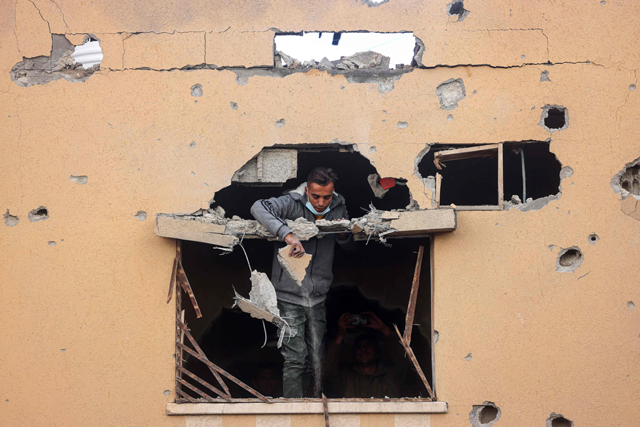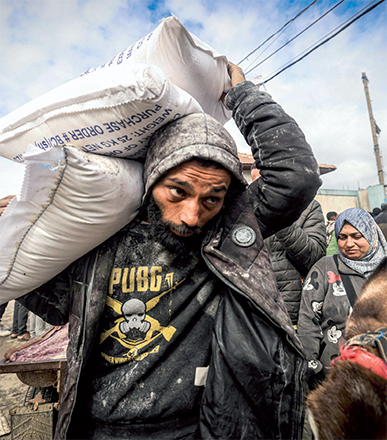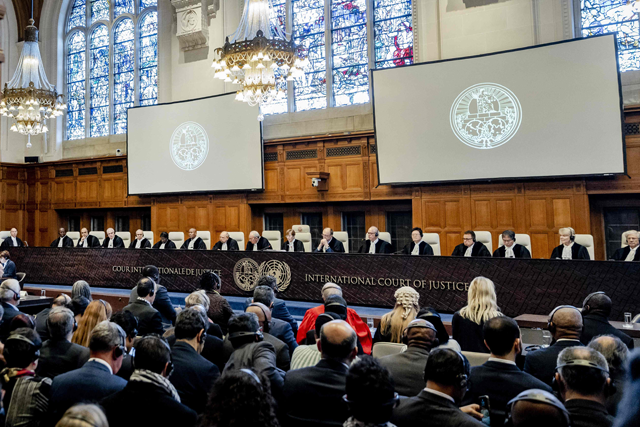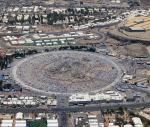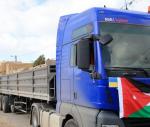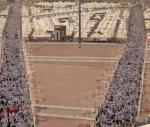You are here
UN warns Gaza faces humanitarian 'collapse' as battles rage
By AFP - Jan 31,2024 - Last updated at Jan 31,2024

Children sit near tents at a make-shift shelter for Palestinians who fled to Rafah in the southern Gaza Strip on Tuesday amid the ongoing Israeli offensive against the besieged enclave (AFP photo)
GAZA STRIP, Palestinian Territories — Artillery fire pounded southern Gaza early on Wednesday as Israel said it has begun flooding Hamas tunnels and mediators sought a halt to the nearly four-month war.
The focus of the fighting in recent weeks has been Khan Yunis, the southern Gaza Strip's main city, where an AFP correspondent reported constant air strikes and shelling overnight.
The health ministry recorded at least 125 deaths across the territory in the latest Israeli strikes.
United Nations Secretary-General Antonio Guterres called his organisation's Palestinian refugee agency the "backbone" of Gaza aid on Wednesday after several countries suspended funding over Israeli claims 12 UNRWA staffers participated in the October 7 surprise attacks.
"Yesterday, I met with donors to listen to their concerns and to outline the steps we are taking to address them... UNRWA is the backbone of all humanitarian response in Gaza," Guterres told a UN committee on Palestinian rights.
UN agency chiefs said a bitter row over the main aid agency for Palestinians could "have catastrophic consequences for the people of Gaza".
Major donors, including Israel’s top ally the United States and Germany, have suspended funding to the UN agency for Palestinian refugees, UNRWA, over accusations that several staff members were involved in the October 7 surprise attack that sparked the war.
Withholding the funds was “perilous and would result in the collapse of the humanitarian system in Gaza”, the heads of the UN agencies said in a joint statement.
Meanwhile mediation efforts gathered pace following a Sunday meeting of top US, Israeli, Egyptian and Qatari officials that produced a proposed framework for a new truce and hostage release.
A Hamas official told AFP that a delegation headed by the group’s leader Ismail Haniyeh “will be in Cairo today or tomorrow [Wednesday or Thursday]” to discuss the proposal.
Following Hamas’s October 7 surprise attack, the Israeli military launched a withering air, land and sea offensive that has killed at least 26,900 people in Gaza, most of them women and children, according to the territory’s health ministry.
‘Constant fear’
In Khan Yunis, the Hamas government media office said there were “dozens of air raids” overnight and vast areas have been reduced to a muddy wasteland of bombed-out buildings.
According to witnesses, artillery shells hit the area of Nasser Hospital, the city’s largest, where the UN humanitarian agency OCHA has said thousands of displaced Palestinians are sheltering.
The Palestinian Red Crescent said on social media platform X that “Israeli shelling and gunfire continue” around another hospital in Khan Yunis.
Staff and patients at the Red Crescent’s Al Amal Hospital “and thousands of displaced people, primarily children and women, live in constant fear and anxiety”, it said.
Israel accuses Hamas of operating from tunnels under hospitals in Gaza and of using medical facilities as command centres, a charge denied by the Palestinian group, designated a “terrorist” organisation by the European Union and the United States.
The Israeli military said it had begun flooding the tunnels with water in a bid to “neutralise the threat of Hamas’ subterranean network”.
An AFP journalist witnessed people fleeing Khan Yunis on Tuesday as explosions sounded nearby.
“We left Nasser Hospital... under tank fire and air strikes. We didn’t know where to go,” said one woman.
“We’re out in the cold, left to fend for ourselves.”
Negotiations
Qatar, which helped broker a previous truce and hostage release in November, voiced hope an initial deal now being negotiated might lead to a permanent ceasefire.
The Hamas official said the group is “open to discussing all issues, including prisoner exchange and reconstruction of the Gaza Strip”, requesting anonymity due to the sensitivity of the talks.
The official reiterated Hamas’s demand for “a comprehensive and complete cessation of [Israel’s] aggression” and the withdrawal of its troops from Gaza.
Violence involving Iran-backed allies of Hamas across the Middle East has surged during the Hamas-Israel war, also drawing in US forces in the region.
President Joe Biden said Tuesday, without offering details, that he had decided on a response to a recent drone strike that killed three US troops in Jordan.
But “I don’t think we need a wider war in the Middle East,” Biden said. “That’s not what I’m looking for.”
A pro-Iran group in Iraq, Kataeb Hizbollah, said it would halt attacks on US “occupation forces, in order to prevent embarrassment to the Iraqi government”.
The United States and Britain have also launched a campaign of air strikes against Yemen’s Iran-backed Houthi rebels, who have carried out repeated attacks on shipping in the Red Sea in what they say is solidarity with Palestinians in Gaza.
The Houthis on Wednesday said they had fired “several” missiles at a US warship, hours after the US military said it had shot down another anti-ship missile over the vital trade route.
Related Articles
GAZA STRIP, Palestinian Territories — Intense fighting raged on Saturday in the Gaza city of Khan Yunis, the main theatre of conflict where
GAZA STRIP, Palestinian Territories — Heavy fighting raged in Gaza on Sunday amid a fierce row over the United Nations agency for Palestinia
THE HAGUE — The UN's top court on Friday said Israel must do all it can to prevent genocide in its war with Hamas and allow aid into Gaza, a


